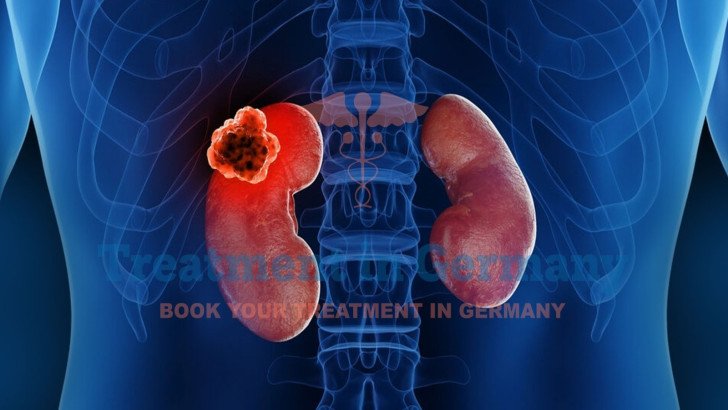
Only after establishing the precise diagnosis and the stage of renal cell cancer tactics of renal cell cancer treatment can be determined.
Renal cell carcinoma (RCC), the most common form of kidney cancer, demands precise diagnosis and tailored management to optimize patient outcomes. In Germany, cancer treatment in Germany integrates advanced diagnostic tools and therapies, including surgery, targeted therapy, immunotherapy, and dendritic cell therapy, delivered by expert doctors in Germany, such as German oncologists for cancer and urologists, in state-of-the-art hospitals in Germany.
Renal cell carcinoma originates in the lining of the kidney’s proximal convoluted tubules, accounting for 85% of kidney cancers. It primarily affects adults aged 60-70, with risk factors including smoking, obesity, diabetes, high cholesterol (hyperlipidemia), and autoimmune diseases. Early-stage RCC has an 81% 5-year survival rate, while stage 4 drops to 10-12% due to metastasis to lungs, bones, or liver.
Germany’s approach combines precise diagnostics with personalized treatments, including surgery, targeted therapy, immunotherapy, and dendritic cell therapy, to control disease progression and improve quality of life. Hospitals leverage latest research in cancer treatment to deliver cancer therapy in Germany.
Accurate diagnosis is essential for effective renal cell carcinoma management. Doctors use advanced diagnostic techniques to confirm RCC, assess its stage, and guide treatment plans.
German oncologists in DKG-certified hospitals provide rapid, accurate diagnoses, often within days, enabling timely innovative cancer treatments in Germany.
Management Options for Renal Cell Carcinoma in Germany
Germany offers a comprehensive range of treatments for renal cell carcinoma, tailored to cancer stage, genetic profile, and patient health. Hospitals integrate cancer treatment options in Germany to maximize efficacy.
Surgery
Surgery is the cornerstone for localized renal cell carcinoma and select metastatic cases.
Targeted Therapy
Targeted therapy for renal cell carcinoma in Germany uses drugs to inhibit specific cancer pathways, particularly for stage 3-4 RCC. Key options include:
These therapies, guided by genetic testing, extend progression-free survival by 12-18 months, per latest research in cancer treatment.
Immunotherapy
Immunotherapy enhances the immune system’s ability to combat renal cell carcinoma. Checkpoint inhibitors like nivolumab (anti-PD-1) and ipilimumab (anti-CTLA-4) achieve response rates of 25-40% in metastatic RCC. Dendritic cell therapy, an innovative cancer treatment, extracts dendritic cells, trains them with RCC antigens (e.g., MUC1, carbonic anhydrase IX), and reinjects them to stimulate T-cell responses. This outpatient therapy, with minimal side effects like fever, is effective for advanced or relapsed RCC, supporting cancer therapy in Germany.
Chemotherapy
Chemotherapy has limited efficacy in renal cell carcinoma due to resistance but is occasionally used in combination with targeted therapy (e.g., gemcitabine) for specific subtypes like sarcomatoid RCC. German oncologists prioritize less toxic options when possible.
Radiation Therapy
Radiation therapy, using stereotactic body radiotherapy (SBRT), targets metastases (e.g., bone, brain) for symptom relief or local control, minimizing damage to healthy tissues.
Clinical Trials and Emerging Therapies
Germany leads in innovative cancer treatments, offering trials for novel therapies like CAR T-cell therapy and combination immunotherapy regimens. These trials, accessible in DKG-certified hospitals in Germany, explore treatments for resistant RCC, improving cancer treatment in Germany.
Why These Treatments Are Effective for Renal Cell Carcinoma
Renal cell carcinoma is heterogeneous, requiring precise and multifaceted management. Germany’s treatments excel because:
Hospitals achieve 65-70% 5-year survival for localized RCC and extend life by 12-36 months in metastatic cases, per clinical data.
Benefits of Renal Cell Carcinoma Management in Germany
Germany’s cancer treatment options in Germany provide significant advantages:
Side effects, such as fatigue or mild surgical discomfort, are managed by doctors in Germany, ensuring patient comfort.
Complementary Therapies Supporting Renal Cell Carcinoma Management
Complementary therapies enhance treatment outcomes:
These are standard in hospitals, ensuring holistic cancer therapy in Germany.
Why Germany Leads in Renal Cell Carcinoma Management
Germany excels in cancer treatment in Germany due to:
Germany’s RCC survival rates exceed EU averages by 5%, reflecting its expertise.
Conclusion
Renal cell carcinoma diagnosis and management in Germany combine precise diagnostics with advanced surgery, targeted therapy, immunotherapy, and dendritic cell therapy. Delivered by expert German oncologists in DKG-certified hospitals, these cancer treatment options are personalized to control disease and enhance quality of life after treatment. With complementary therapies and trial access, Germany is a premier destination for RCC care.
FAQS
What are the best ways to diagnose renal cell carcinoma in Germany?
Advanced CT scans, MRI, ultrasound, and genetic testing confirm renal cell carcinoma and its stage.
What treatments are available for renal cell carcinoma in Germany?
Options include surgery, targeted therapy, immunotherapy, dendritic cell therapy, ablation, and radiation.
How much does renal cell carcinoma treatment cost in Germany?
Costs vary based on treatment plan and individual needs; estimates can be requested from medical facilities.
Can renal cell carcinoma be cured with treatment in Germany?
Early-stage renal cell carcinoma has a high cure rate; advanced cases are managed to extend life and quality.
How effective are treatments for renal cell carcinoma in Germany?
Treatments are highly effective, offering strong survival rates and extended life with targeted therapy and immunotherapy.
How experienced are German doctors with renal cell carcinoma?
German specialists are global experts in innovative cancer treatments for renal cell carcinoma management.
How long is the wait for renal cell carcinoma treatment in Germany?
Diagnostics and treatment typically start within 1-2 weeks.
Are clinical trials available for renal cell carcinoma in Germany?
Yes, trials for innovative cancer treatments like dendritic cell therapy are available for eligible patients.
How does Germany’s renal cell carcinoma treatment compare to other countries?
Germany leads with advanced cancer therapy and high survival rates for renal cell carcinoma.
Can I get a treatment plan before traveling to Germany?
Yes, hospitals can provide personalized renal cell carcinoma treatment plans based on medical records.
For more information or a free consultation, visit our contact us page
Kindly complete the form below, and our dedicated team will reach out to you promptly. We look forward to connecting with you soon!
Trierer Straße, 56072 Koblenz, Germany

.webp)
 (1).webp)

.webp)
 (1).webp)


.webp)
 (1).webp)

.webp)
 (1).webp)
